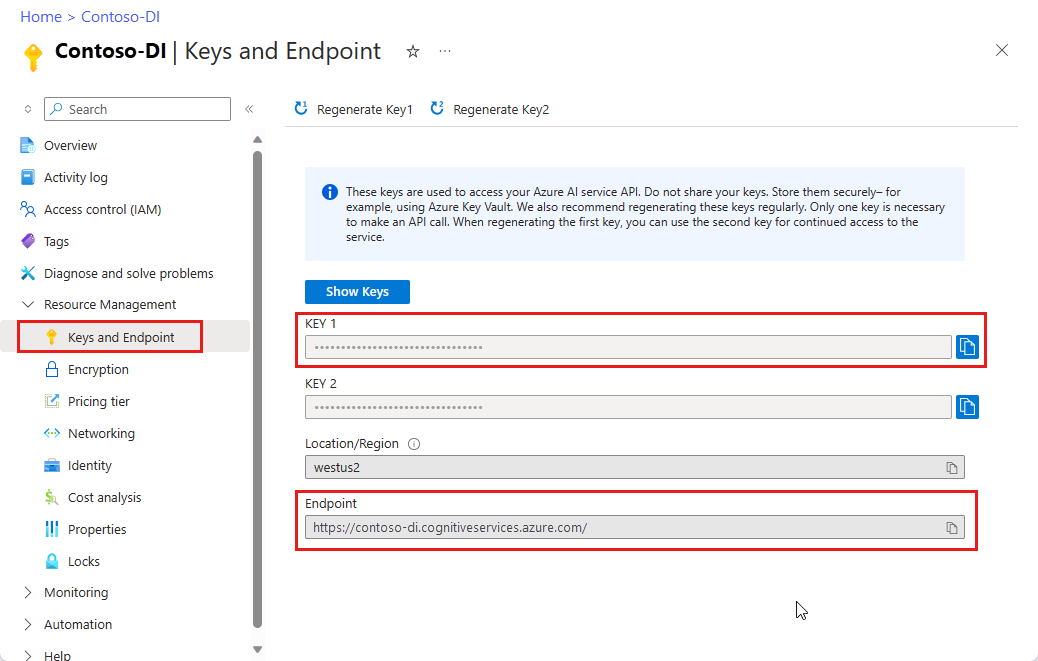Note
Access to this page requires authorization. You can try signing in or changing directories.
Access to this page requires authorization. You can try changing directories.
The Document Intelligence bank statement model combines powerful Optical Character Recognition (OCR) capabilities with deep learning models to analyze and extract data from US bank statements. The API analyzes printed bank statements; extracts key information such as account number, bank details, statement details, transaction details, and fees; and returns a structured JSON data representation. With V4.0 GA, you can now extract check tables in the US bank statements.
| Feature | version | Model ID |
|---|---|---|
| Bank statement model | v4.0: 2024-11-30 (GA) | prebuilt-bankStatement.us |
Bank statement data extraction
A bank statement helps review account's activities during a specified period. It's an official statement that helps in detecting fraud, tracking expenses, accounting errors and record the period's activities. See how data is extracted using the prebuilt-bankStatement.us model. You need the following resources:
An Azure subscription—you can create one for free
A Document Intelligence instance in the Azure portal. You can use the free pricing tier (
F0) to try the service. After your resource deploys, select Go to resource to get your key and endpoint.
Document Intelligence Studio
On the Document Intelligence Studio home page, select bank statements.
You can analyze the sample bank statement or upload your own files.
Select the Run analysis button and, if necessary, configure the Analyze options :

Input requirements
The following file formats are supported.
| Model | Image: JPEG/JPG, PNG, BMP, TIFF, HEIF |
Office: Word (DOCX), Excel (XLSX), PowerPoint (PPTX), HTML |
|
|---|---|---|---|
| Read | ✔ | ✔ | ✔ |
| Layout | ✔ | ✔ | ✔ |
| General document | ✔ | ✔ | |
| Prebuilt | ✔ | ✔ | |
| Custom extraction | ✔ | ✔ | |
| Custom classification | ✔ | ✔ | ✔ |
- Photos and scans: For best results, provide one clear photo or high-quality scan per document.
- PDFs and TIFFs: For PDFs and TIFFs, up to 2,000 pages can be processed. (With a free-tier subscription, only the first two pages are processed.)
- File size: The file size for analyzing documents is 500 MB for the paid (S0) tier and 4 MB for the free (F0) tier.
- Image dimensions: The dimensions must be between 50 pixels x 50 pixels and 10,000 pixels x 10,000 pixels.
- Password locks: If your PDFs are password-locked, you must remove the lock before submission.
- Text height: The minimum height of the text to be extracted is 12 pixels for a 1024 x 768-pixel image. This dimension corresponds to about 8-point text at 150 dots per inch.
- Custom model training: The maximum number of pages for training data is 500 for the custom template model and 50,000 for the custom neural model.
- Custom extraction model training: The total size of training data is 50 MB for template model and 1 GB for the neural model.
- Custom classification model training: The total size of training data is 1 GB with a maximum of 10,000 pages. For 2024-11-30 (GA), the total size of training data is 2 GB with a maximum of 10,000 pages.
- Office file types (DOCX, XLSX, PPTX): The maximum string length limit is 8 million characters.
Supported languages and locales
For a complete list of supported languages, see our prebuilt model language support page.
Field extractions
For supported document extraction fields, see the bank statement model schema page in our GitHub sample repository.
Supported locales
The prebuilt-bankStatement.us version 2027-11-30 supports the en-us locale.
Next steps
Try processing your own forms and documents with the Document Intelligence Studio
Complete a Document Intelligence quickstart and get started creating a document processing app in the development language of your choice.